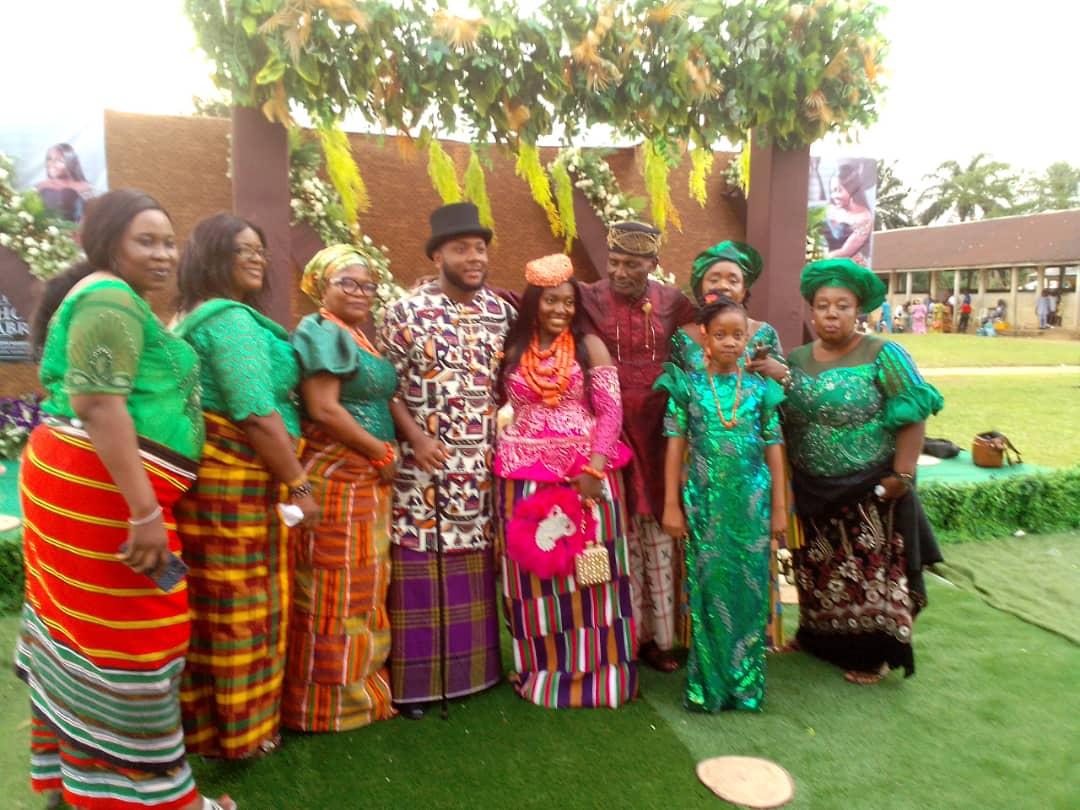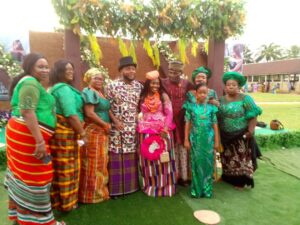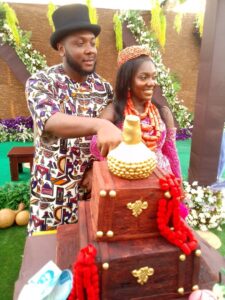Women
Women And Equal Representation In Society

Women’s full and equal participation in all facets of society is a fundamental human right. Yet, within our communities, states and Nigeria at large and in fact the world over from politics to entertainment to the workplace, women and girls are largely under-represented.
When we take a closer look at this gender sensitivity over time, it clearly shows it has been imbalance.
Perhaps due to culture, norms and traditions, the consequences are far-reaching with detrimental and negative consequences on the personal, economic and future well-being of women and girls, their families and the community at large.
Building a sustainable future for all, means leaving no one behind. Women and girls are critical to finding solutions to the biggest challenges we face today and must be heard, valued and celebrated throughout society to reflect their perspectives and choices for their future and that of their families and society at large.
How many more generations are needed for women and girls to realise their rights? Women must begin to demand equal rights and opportunities for all folks.
Politically, women’s representation globally has doubled in the last 25 years. But, this only amounts to around one in four parliamentary seats held by women today.
Women continue to be significantly under-represented in the highest political positions. In October 2019, there were only 10 women Heads of State and 13 women Heads of Government across 22 countries, compared with four Heads of State and eight Prime Ministers across 12 countries in 1995.
At workplace, about two years ago, out of the 500 chief executives leading the highest-grossing firms, just under 7 per cent are women. Thank goodness, our own Dr. Ngozi Okonjo-Iweala is the current Director-General of the World Trade Organisation {WTO).
When looking at the workforce as a whole, the gender gap in labour force participation among prime working age adults (25 to 54) has stagnated over the past 20 years. Improved education among women has done little to shift deeply entrenched occupational segregation in developed and developing countries. Women continue to carry out a disproportionate share of unpaid care and domestic work. Women and girls are responsible in 80 per cent of households that do not have access to gender-sensitivity. Women and girls have little time for rest and sleep. If you allow them, they will work for 24 hours non-stop.
Annually, recognition of intellectual achievements and academic, cultural and scientific advances, the Nobel Prize has been awarded to more than 900 individuals in the course of its history from 1901 to 2019. Only 53 of the winners have been women, 19 in the categories of Physics, Chemistry, and Physiology or Medicine. Marie Curie became the first female laureate in 1903, when she and her husband won a joint Prize for Physics. Eight years later, she was solely awarded the Chemistry Prize, making her the only woman in history to win the Nobel Prize twice. Although women have been behind a number of scientific discoveries throughout history, just 30 per cent of researchers worldwide and 35 per cent of all students enrolled in STEM-related fields of study are women.
When it comes to equality of men and women in news media, progress has not been encouraging. According to reports, participation and representation of women in the news media for about two decades in many countries, only 24 per cent of the persons heard, read about or seen in newspaper, television and radio news are women. A lot of improvement has been recorded for women news reporters in newspaper bylines and newscast reports, with 37 per cent of stories reported by women as of 2015, showing little difference over a decade. Despite the democratising promise of digital media, women’s poor representation in traditional news media is also reflected in digital news, with women making up only 26 per cent of the people in Internet news stories and media news tweets. Only 4 per cent of traditional news and digital news stories clearly challenge gender stereotypes. Among other factors, stereotypes and the significant under-representation of women in the media play a significant role in shaping harmful attitudes of disrespect and violence towards women.
If you talk about entertainment industry, like other forms of media, film and television have a powerful influence in shaping cultural perceptions and attitudes towards gender and are key to shifting the narrative for the gender equality agenda. Yet, an analysis of popular films across 11 countries found, for example, that 31 per cent of all speaking characters were women and that only 23 per cent featured a female protagonist, a number that closely mirrored the percentage of women filmmakers.
The gross under-representation of women in the film industry is also glaringly evident in critically acclaimed film awards: In the 92-year history of the Oscars, only five women have ever been nominated for the Best Director Award category; and one woman, Kathryn Bigelow has ever won.
A lot of women in Nigeria, like Liz Benson, Eucharia Anunobi, Patience Ozokwo, Joke Silva, Monalisa Chinda, to mention but a few, have done well in the entertainment industry. But we need more women in film, on-screen and off-screen.
In sports, the power to inspire change and break gender stereotypes is possible and women have been doing just that decade after decade, showing that they are just as capable, resilient and strong as men physically.
Today, women are far more visible in sports than ever before: The Tokyo 2020 Olympics is projected to have close to equal representation of women and men competing for the first time in its history. For comparison, only 22 women (2.2 per cent) out of a total of 997 athletes competed in the modern Olympics for the first time in 1900. Women and men will compete in almost all sports categories.
Chioma Ajunwo and Mary Onyeali are some of the sportswomen in Nigeria we can talk about when it comes to excellence.
Despite progress, women still continue to be excluded in certain sports in parts of the world and are paid far less than men in wages and prize money globally. Women need to be encouraged more in sports like the men.
Despite women being prescribed stereotypical roles in the kitchen at home, the upper echelons of the restaurant industry have remained relatively closed to female chefs Women must often overcome active discrimination and move away from a culture that both glorifies masculinity and tacitly condones harassment. Paired with long, unpredictable and inflexible working hours, unfriendly family and childcare policies and lower salaries, women face enormous challenges when entering the restaurant business. Women need to be in control of hospitality business as chefs..
By: Eunice Choko-Kayode
Women
The Desire Of Every Woman In Marriage

A woman needs a man that is honest, trustworthy, nice, loving and financially stable.
There are no two ways about finance in marriage. No matter the level of love, If there is no money, it is always difficult.

Referring to the Biblical belief in Genesis 3:Your desire shall be unto you……..
That is one aspect the woman expects her husband to take care of.
A woman wants a husband that is not lazy, at least helping to do one or two things. A man that is educated and intelligent.
She knows that there is a trait that her husband has. Traits of taking care of people, giving freely to people and caring for her family.
A woman wants to love a husband that has family interest at heart. A man that spends time with his family, remembering his family even as he is away from home.
A woman should not antagonise her husband because of one error or the other. No matter the level of offence he may have committed, you still show some love.

According to the Scripture, it is with wisdom that the women builds her home.
It is not as if the woman will not monitor her husband, but to certain limit. Don’t be a monitoring spirit. Don’t allow anything to take your joy.
Don’t loose trust in your husband.
The idea of checking your husband’s phone should be discouraged. The more you check your husband and his phone, the more you loose your joy.

The home should not be a battle ground for a woman and man. A woman should be able to ask herself if the check on her husband will pay her any good.
Draw a line to a point where you checkmate your husband’s activities.
A woman wants a man that will love her and telling her you love her will be all she desires.
Eunice Choko-Kayode
Women
What Women Want In Yet-To -Be Husbands
What women want in their yet-to- be husbands matters a lot as far as marriage is concerned.
A woman desires a good fnancial prospect. Interestingly, some modern women place a man’s financial potential as more desirable than they have in the past.
Many decades ago, women ranked it lower on the list. It still comes in after items like love and maturity, but perhaps today’s women realise that a good economic partner is good husband material.
Good health has been an important characteristic for women through the 20th century and remains so these days. One might argue that because we’re living even longer, health plays a huge role in the success of a marriage. Women are anxious to know that their partners are healthy to be able to run the family together.
You discover that in most faith based organisations, would- be couples are mandated to go for medical tests to ascertain their health status as it concerns HIV/AIDS, Genotype and other related ones. This according to stakeholders is to ensure that couples raise healthy families.
Ambition has become less important to women over time, though it still being considered even if women nowadays are thriving in the workforce competing with the male folk. It may be because more women are thriving in the workforce, they want a husband who has earning power but are not looking for him to be the sole provider.
More women want husbands with pleasing disposition. They may not want a man who is always moody. A man who is always cheerful is whom they desire.
Surprisingly, a man’s likes do not rank as high on women’s list of wants as it used to. Until recently, women are more willing to accept a man for who he his, despite the inevitable mood he may be.
Sociability from both men and women rank very high on their marriag material list. And for both sexes, it has been steadily moving up the list for many years. The rise of the “love marriage,” a partnership based on attraction rather than practicalities (like wealth or status) might mean that married couples are more likely to be friends and have mutual circles of friends.
A lot of couples want to associate with others and then socialise. Attending parties of other friends forms part of their marriage requirements.
Women have placed education and intelligence top making it one of their most desirable male traits for decades. This timeline coincides with more and more women receiving college education themselves. Once education becomes important in women’s lives, it is a more attractive trait in potential husbands.
Of course when a woman is educated, she is likely to go for an educated man. When they are gainfully employed, their income boost the family affairs faster.
Today, women are much more attracted to men who are interested in home and family than they ever have been. Men who have desire for their home and children is whom they desire.
After a days job, a man will come home to ensure that his children are comfortable. Because most women today are expecting to be in dual-earner relationships, they want husbands who will be happy and willing to contribute at home. More women today even report that they hope he will take the lead at home.
A woman wants a man who is emotionally stable and mature. Growing big physically is not the issue but maturity in the heart.
Men, too, place a heavy emphasis on a potential wife’s emotional maturity, signaling that it is a key quality for a stable partnership. Women seem to look past appearance to the heart of the matter.
A woman wants a man who is not easily provoked. Dependable character is what some women want in marriage.
Women want husbands that they can count on, and this has not changed in recent years. Yes, women look to their spouses to be lovers and friends, they also want them to be supportive and trustworthy. They want to know that their husbands will be there and remain loyal. Men, too, desire dependable character from their yet-to be wives.
Mutual attraction and love from the first appearance is what they want till they become old.
The highest-rated characteristic women seek from men is mutual attraction and love. Some no longer look for a man who will provide everything, afterall they are also educated and are gainfully employed, they want to be in love.
For some women, even when the man do not provide household needs, the love shown on her is enough. When women had no job prospects and needed to marry, they desired love . The women’s movement has not only helped women pursue careers, it has also given them more choice in love.
Women
Echoes Of IWD : Need To Invest In Women
As this year’s Internatinal Women’s Day (IWD) has come and gone, there are calls from different quarters on the need to invest in women so that we can achieve accelerated growth.
It was, indeed, a thing of joy when Rivers Women Unite For Sim, took delivery of large quantities of sanitary towels and some bags of rice provided them for this year’s celebration.
Many young women expressed joy that they got such gesture since some of them have financial problems getting sanitary towels whenever they are on.
Some secondary school students were also lucky to have a share of the benefits. They also got some sanitary towels.
The Rivers State Commissioner for Women Affairs organised a platform to celebrate and honour the women for the remarkable jobs they perform in their homes and society.
Addressing women on the occasion, the Hon. Commissioner for Women Affairs, Dr. Roseline Apawari Uranta, noted that women from time immemorial have been great pillars in achieving remarkable heights and stressed that IWD across the globe is pivotal all women for the roles they play in bringing, nurturing and sustaining life.
Dr. Uranta said that IWD, which started in 1911 and celebrated annually on March 8, is a global day that provides women a platform to address economic inclusion, participation in political and public life.
She said the day was set aside to look into lack of access to education for the girl-child, gender-based violence, child marriage, child trafficking, harmful cultural practices as well as other challenges facing women around the globe.
The Hon. Commissioner, who described March 8 as a day to celebrate the socio-economic, cultural and political achievements of women, emphasised that it is a day that offers women the opportunity to reflect on progressive achievements.
Noting that it is an opportunity to call for change, she stressed that it is also an opportunity to celebrate acts of courage and every achievement made by ordinary women who did extraordinary things and are remembered in history.
She noted that the IWD2024 theme:”Invest In Women, Accelerate Progress”, is timely and apt because according to her, to achieve gender equality, we must ensure that the rights, responsibilities and opportunities of women do not elude them.
Her words: ” We must see investing in women as a human right issue and consider investing in women as a social tool to eradicate poverty since women are helpmeet in the homes while a handful are breadwinners in their respective families”.
The commissioner urged women to uphold the deliberate act of investing in themselves, be it furthering formal education, developing a new skill as well as learning a trade.
“Shun idleness, always find something positive and productive to do, regardless of your age, social status and financial capabilities”, she said.
In a paper presentation, Dr. Dabota God’swill Jumbo, reiterated that investing in women would attract good and positive dividends to herself and the society at large and noted that it is essential in addressing poverty, hunger and climate change.
The guest speaker said women need more opportunities in elective and appointive positions, hence the need to encourage and support them in politics.
According to her, when you invest in women, they will be able to create safer environment devoid of gender-based violence.
In a goodwill message, the spokesperson, Rivers Women Unite For Sim, Mrs Charity Deemua appreciated the organisers for making it possible for women to gather and celebrate themselves.
She commended those who created a day like March 8 of every year to celebrate women and regretted that the girl-child was seen as a second-class person decades ago.
The former commissioner, Rivers State House of Assembly Commission, described those who taught it wise for women to celebrate as conquerors, tough and strong.
International Association of World Peace Advocates, a world-class organisation with the United Nations, honoured different categories of women.
In Cross River State, 150 women were empowered with about N15m to boost their small and medium scale businesses.
According to stakeholders, the women empowerment is vital in addressing social, economic and political challenges and will make them self-reliant.
An NGO, Association of Professional Women Engineering Technologists (APWET), said it’s aim is to promote professional excellence among engineering personnel, advocating for women and girl-child education.
With what we saw in terms of response to women’s call on issues affecting them from relevant authorities, we are optimistic that the women will do better whenever they are empowered.
If we must kick out cervical, breast and other forms of cancer in women, underage marriage, prostitution, we must invest in women.
There were goodwill messages from National Council for Women Societies (NCWS), International Federation of Female Lawyers (FIDA), Medical Women Association of Nigeria (MWAN), Nigeria Copyright Commission (NCC, Nigeria Association of Female Journalists (NAWOJ), among others.
By: Eunice Choko-Kayode
-

 News2 days ago
News2 days agoFG Set To Receive Fresh $2.2bn World Bank Loan
-

 Business2 days ago
Business2 days agoAviation Union Threatens Strike Over Revenue Deduction
-

 News2 days ago
News2 days agoNCCSALW Destroys 6,000 Illicit Arms In Six Geo-Political Zones
-

 News2 days ago
News2 days agoAkpabio Seeks Nigeria, Serbia Parliamentary Collaboration
-

 Rivers2 days ago
Rivers2 days agoNCSU Hails Release Of Fubara’s Supporters
-

 Maritime2 days ago
Maritime2 days agoTin Can NCS Generates N303.9bn In Q1
-

 News2 days ago
News2 days agoOur Policies Aligning With Tinubu’s Renewed Hope Mantra For Nigeria -Gov Fubara
-

 Business2 days ago
Business2 days agoPaper Industry’s Economic Contribution Hits N398bn

